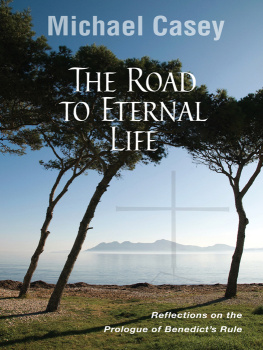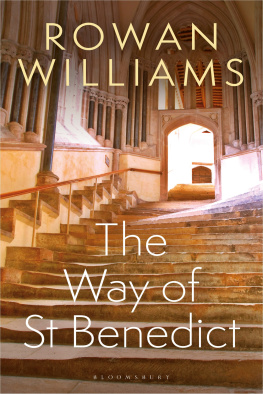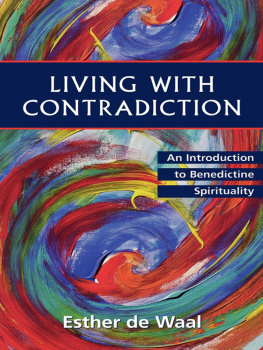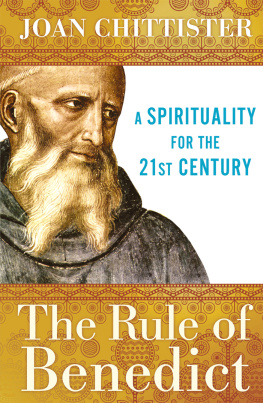STRANGERS
TO THE
CITY
REFLECTIONS ON THE
BELIEFS AND VALUES
OF THE RULE
OF SAINT BENEDICT
Michael Casey, ocso
Monk of Tarrawarra

PARACLETE PRESS
BREWSTER, MASSACHUSETTS
STRANGERS
TO THE
CITY
Strangers to the City: Reflections on the Beliefs and Values of the Rule of Saint Benedict
2008 Third Printing
2006 Second Printing
2005 First Printing
2005 by Michael Casey
ISBN: 978-1-55725-460-3
Library of Congress Cataloging-in-Publication Data
Casey, Michael, 1942
Strangers to the city : reflections on the beliefs and values of the Rule of Saint Benedict / Michael Casey.
p. cm.
ISBN 978-1-55725-460-3
1.Benedict, Saint, Abbot of Monte Cassino. Regula.
2.BenedictinesRules. I. Title.
BX3004.Z5C339 2005
255'.106dc22 2005010809
The Scripture translations were made directly from the Greek or Hebrew by the author.
The translations of The Rule of St. Benedict were also made directly from the Latin by the author.
10 9 8 7 6 5 4 3
All rights reserved. No portion of this book may be reproduced, stored in an electronic retrieval system, or transmitted in any form or by any meanselectronic, mechanical, photocopy, recording, or any otherexcept for brief quotations in printed reviews, without the prior permission of the publisher.
Published by Paraclete Press
Brewster, Massachusetts
www.paracletepress.com
Printed in the United States of America
In memory of
Helen Lombard
1936 2000
Sister of the Good Samaritan
A Lover of the Rule
Preface
W hen monks and nuns commit themselves entirely to God in the solemn act of monastic profession it is as though they change their citizenship. Now they are citizens of heaven, living in an extraterritorial outpost that medieval authors termed the cloistral paradise. Monastic living is, however, more than a question of location. Beyond prolonged residence in the place, commitment is demanded. This, in turn, implies more than mere punctiliousness in obeying the laws and observing local customs. It asks us to take on a new identity and to be reshaped according to a different culture. This refashioning must come from within. It cannot be superimposed by external pressure on an otherwise recalcitrant individuality. From the very beginning the candidate to monastic life is asked to consent to a different world-view, where previous priorities are turned upside down and a lifelong process of unlearning, learning, and relearning is initiated.
The transformation that occurs in monasteries is Gods work, and no human effort can bring it about. Nevertheless it is a work in which the monk or nun has a role to play. There is an active phase in monastic growth where much effort needs to be expended. St. Benedict envisages the monk as a good tradesman, persevering in his task and making use of whatever implements are required to perform it well. In he lists no less than seventy-three implements to be found in the monastic workshopsome of them more important than others, but all available should the need arise. The skilled worker is one who is able to recognize when a particular implement is called for and has the ability to use it appropriately.
In this book I am going to reflect on a number of the monastic means to holiness that I find in the Rule of St. Benedict and that to me seem particularly relevant not only to monasteries but to the Church as a whole. What Benedict presents to us is no more than a digest of gospel teaching applied to a particular situation. I hope to reflect on his words in a way that will enable you, the reader, to apply this doctrine to your own circumstances and perhaps find in the ancient writings words that are life-giving.
The key idea of this book is expressed in its title. Benedict advises his monks to make themselves strangers to the actions of the ageto become strangers to the city. This is done first by living somewhat apart, morally more than physically. The purpose of this separation from the world is to facilitate a distinctive lifestyle, based on distinctive premises and priorities. It must be obvious, moreover, that the maintenance of this particular way of life depends on an infrastructure of beliefs and values: Without personal convictions monastic living is no more than a pious charade. The monastic sub-culture, like every other, includes a good measure of theory as well as practice. Apart from this theory monastic living lacks integrity and is liable to exhaust itself in mindless virtue. There is, as has often been said, nothing so practical as good theory.
Most monastic people understand that the realistic living of monastic life (or conversatio) demands more than doing good and avoiding evil. It asks for a progressive and substantial change in attitude. We have constantly to take on board new beliefs and values, and submit to question some aspects of the philosophy of life we have built since our youth. This is the ongoing conversion that is demanded of us: more and more to view things with the eyes of Christ and to leave behind the self-serving individualism that has become our regular mainstay in thought and action.
This is a program of life so demanding that we readily seek meritorious distractions from its severity. We must beware. If we indulge in too much escapist behavior our whole life becomes fuzzy and we lose a sense of its direction. It is much better to be clear about what life is meant to be even when we fall far short of our ideal. That way, and with Gods grace, we keep trying and, perhaps, with the passage of time our hearts become purer and our lives simpler. At least that is the way it is supposed to be!
The service rendered to the Church by fervent followers of St. Benedict is their stable and persevering effort to live lives shaped by the gospel. They aspire to create in the common microcosm of the monastery a miniature church where the universal struggle of divine grace and human sinfulness is played out. Only the outsider can perceive which way the battle is going. The insider is aware mainly of the grim reality of weakness and precariousness on every side. Hope in the victory of Christ is not yet seen, but clung to in faith.
In this book I am inviting you to enter with me into the monastic experience where, as in your own experience, life and death contend. Your experience will not be the same as mine. I am a male, a monk, an Australian, and probably in the final quadrant of my life. I speak as one formed in a specifically Cistercian approach to the Rule. Chances are that your CV scarcely overlaps with mine. That could be an asset. What I see from my vantage point is probably different from what you see from yours. With a bit of effort a fusion of horizons may occur so that from these pages you might see something in the Rule that you did not notice previously. I hope that a fuller contact with the life-enriching vision of St. Benedict will be a means of greater access to the evangelical wisdom that he taught through his Rule and through the form of monastic living that he established.
This book started life as an address given to a gathering of the Communio Internationalis Benedicinarum on 14 September 2003. It was published in Tjurunga 66 (2004), pp. 3447. Since then the material has been workshopped with various monastic groups around the world. I am very grateful to all who have given me feedback and encouraged me to keep expanding the topic.
Michael Casey
11 July25 December 2004
To make oneself a stranger to
Next page










